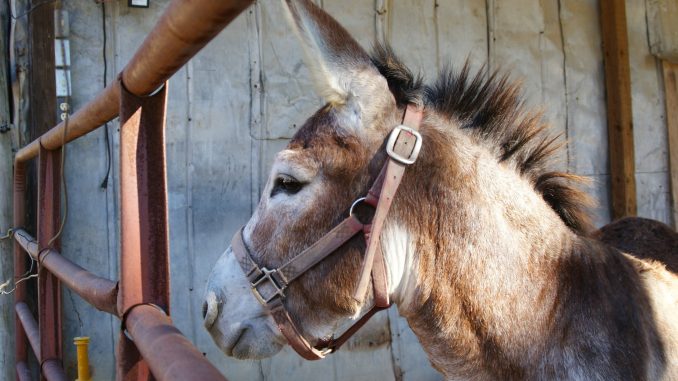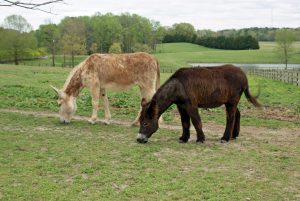
By Donna Campbell Smith
On the way to lunch with a friend, I passed four pastures with a donkey. Two were with horses, one with goats and one with cattle. More and more folks are adding a donkey companion to their herds, whether as a guard for livestock, a pet, or mount. Perhaps the donkey is a rescue with no other purpose but to enjoy life. Whatever the purpose donkey ownership seems to be on the rise.
Sometimes the new donkey owner has never cared for a donkey before. For the donkey to have a long and happy life it is important for their new owners to learn that donkey management differs greatly from managing other livestock, even horses.
Most of the differences can be attributed to the donkey’s origin which is the deserts of Asia and Africa. Their bodies have been designed to survive on very little substance. They need less energy and protein in their diet than horses. Donkeys thrive on forages high in fiber and tend to browse as well as graze. Also, food stays in the donkey’s digestive tract longer than it does in horses, so they digest more efficiently and therefore require less food than horses of similar size. Over-feeding can lead to various metabolic diseases including colic and founder.
Donkeys may need their access to pasture restricted in the spring and summer months. This can be accomplished by dividing the pasture and rotating the donkeys on smaller tracts or by using a grazing muzzle. Supplement pasture with hay and straw in winter. Donkeys seldom need concentrated feeds or grains. Never feed supplements meant for other animals like cattle or swine. Do provide a salt and mineral block. Any changes in the donkey’s diet should be made gradually. Monitor the donkey’s eating habits. When a donkey goes off its feed, it is cause for concern and a veterinarian should be consulted.
Another thing to know about donkeys is that they have a high pain threshold. By the time it is obvious they are in pain it may be too late, especially in the case of colic. It is important to monitor the donkey’s vital signs and behavior to be alert to changes that may indicate illness. Owners should observe their donkey daily to know what its “normal” behavior looks like.
Donkeys need space to exercise for their physical and mental well-being. They also enjoy rolling, preferably in a sandy bare spot. In addition to a good back scrub it is a natural way to repel insects.
Unlike horses, rain does not roll off donkeys’ backs. Their coats absorb melted snow and rain, soaking them down to their skin. Donkeys can normally tolerant cold, but not cold and wet. For that reason, they need shelter from rain and snow. When given their choice to be inside or out, most donkeys will opt to stay outside their shelters. So, in extreme winter conditions as in ice and sub-freezing temperatures, especially with very young or old donkeys closing them in a shelter is necessary. Again, donkeys are very stoic animals and often do not show signs of distress. In summer the shelter provides shade and relief from flies.
While most donkeys will chase away dogs or other predators that venture into the pasture, not every donkey is suited to being a guard. Miniature or small standards can be victims to prey animals and should not be used to guard. Donkeys will also tattle; braying to let the world know the herd has been invaded. That works fine if there is someone close enough to hear the racket.
Donkey require regular care that other livestock do not. Like horses, they should be vaccinated, usually annually, against disease, dewormed regularly, and have their hooves treats every eight weeks.
Donkeys are affectionate. One reason donkeys make good pets is because they do not like to be alone, and are happy for companionship with their human friends, especially if there is not another donkey around. In fact, it is advisable to get two donkeys rather than pasture it alone.
Donkey owners and trainers agreed on one important factor in donkey training and handling: that it requires patience. Donkeys don’t think like a horse. Therefore, they react and behave differently. While the things we want to teach to a donkey are the same things we teach a horse, we may have to approach it in different ways.
A horse’s natural defense is to run when it feels threatened. When something threatens the donkey he first stops and sizes up the situation to determine if it is a real danger or not. If push comes to shove, the donkey will fight off its aggressor. So, when we think a donkey is being balky, it is sensing danger and is stopping to figure it out and decide how to proceed. So, rather than reacting to mob hysteria like a horse, donkeys think more independently.
A donkey “hello” maybe be disconcerting to people, especially horse people. A donkey greeting often involves the donkey leaning into the person they like, in a sort of donkey-hug. The first impulse for the human who doesn’t know this is to try and push the donkey away, only to have the donkey just lean some more. Donkey thinks human is returning the affection. Donkeys must be taught what “move away” means through training.
Give your donkey every reason to trust that you will not put him in harm’s way, and you will enjoy a lasting relationship.
_____________________
Donna Campbell Smith, an author based in Franklinton NC, worked in the horse industry for over thirty years as an instructor, trainer, breeder, and writer. She has an AAS Degree in Equine Technology from Martin Community College and is a certified riding instructor. Smith has written four non-fiction books on equine management: The Book of Donkeys, (The Lyons Press 2016) The Book of Miniature Horses (The Lyons Press 2005), The Book of Draft Horses (The Lyons Press 2007), and The Book of Mules (The Lyons Press 2009. All her books are available at Amazon.com or ask for them at a bookstore near you.
Donna is a member of Franklin County Arts Council. Visit her website at www.donnacampbellsmith.com.



